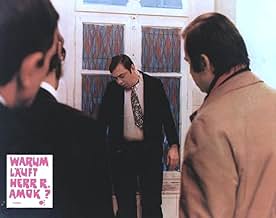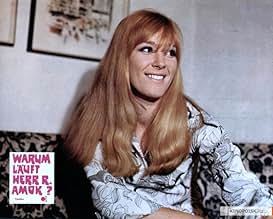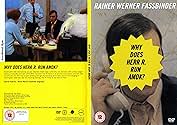Adicionar um enredo no seu idiomaWith slicked-down hair and three-piece suits, dependable Herr Raab is a technical draftsman. He gets along with his colleagues although his boss wants him to go beyond technical cleanliness ... Ler tudoWith slicked-down hair and three-piece suits, dependable Herr Raab is a technical draftsman. He gets along with his colleagues although his boss wants him to go beyond technical cleanliness to problem solving. He's a dutiful husband; his wife's a social climber and pushes him to ... Ler tudoWith slicked-down hair and three-piece suits, dependable Herr Raab is a technical draftsman. He gets along with his colleagues although his boss wants him to go beyond technical cleanliness to problem solving. He's a dutiful husband; his wife's a social climber and pushes him to seek a promotion, but they also share sweet moments. He's a caring father, helping his son... Ler tudo
- Direção
- Roteiristas
- Artistas
- Prêmios
- 3 vitórias e 2 indicações no total
- Kollege im Büro
- (as Harry Bär)
- Opa Raab
- (as Herr Sterr)
- Oma Raab
- (as Frau Sterr)
- Schallplattenverkäuferin
- (as Carla Aulaulu)
- Direção
- Roteiristas
- Elenco e equipe completos
- Produção, bilheteria e muito mais no IMDbPro
Avaliações em destaque
Because, frankly, this isn't like the Fassbinder you would be used to after seeing, for example, the BDR trilogy or Fear Eats the Soul. It's as if Fassbinder and/or Fengler contracted Al Maysles to follow an 'average' middle-class German family, the father and architect and the wife a, uh, house-wife I guess, with an 'average' child. The style of dialog is improvisation, and the camera-work reflects this with the "cienema verite" approach. Indeed there may be only about 30 actual shots in the whole film; it's a series of long takes as the DP, Dietrich Lohmann, goes around a room and zooms in or out based on a feeling here or there or something that may be of interest (such as the desperation Herr R tries his best to hide in most scenes).
What happens with this style, for better or worse, is that we get into the daily grind, the mundane conversations in a living room or in a car (i.e. car repairs), a trip to the school for a talk with the teacher about the kid, or a trip to the not-totally sympathetic doctor, or the embarrassing toast that Herr R makes in front of his co-workers and boss. There is the mundane, and its so much that one starts to get into this mood. There is a drawback if one isn't ready/willing/able to be in this style; not a lot "happens" in the film until, of course, the frighteningly sudden climax of the "Amok" part of the title. Indeed there's something to this that draws in the audience with the characters; there's a scene where Herr R, his wife, their son and a couple of friends are walking along on a road, and it goes on for so long (both the shot and the slow walk) we, as well as the parents, don't realize that the son has gone off on his own and don't know where he ventured off.
Herr R. is an emotional story, but it's a little hard to penetrate. But for those who are patient and attentive there are some great rewards. One of these is Kurt Raab's performance (who, by the way, is also called Mr. Raab in the film, which adds to the confusion of whether this is documentary or fiction, or both at the same time); it's a performance that is tricky but works very well, full of subtlety and restraint, eyes darting carefully and physical expressions to the dot meant with importance. The performance is improvised, but there's nothing I can see that wasn't thought through to be on the screen by Fassbinder and/or Fengler. And it's this character, if nothing else, that marks it as the indicator of it being from RW; it's about the alienation of an outsider, someone in such a mundane world, so "normal" that there is barely any expression of individuality, of anything outside of a "norm" being seen as anything except quiet (or not so quiet) scorn. This is set up from the start with the characters telling the jokes, and Herr R's going flat with everyone else.
It's basically a super-low budget experiment in reality-as-drama, about the emptiness of a class system that allows people to live comfortably and with some semblance of peace, but also a form of life that can be shattered so easily and with such terror. The ending, indeed, can only be really comparable to the likes of Haneke's Cache for its random, existential impact. The more one lets Herr R in, the more this world is horrible and cruel and desperate. Not the brightest of times to have, but worthwhile all the same.
Although Fassbinder is credited as writing and directing this film, it has since come to light that he probably did neither. The writing was largely improvisation, and the directing was exclusively Michael Fengler (a longtime Fassbinder collaborator).
Frankly, I am glad that this is not a real Fassbinder because he makes some excellent movies... but, for me, this would not be one of them. It just runs on, with people rambling for the entire duration. The reviews tend to be positive, but I see it as a film where nothing happens. And not in a funny way, just in a very pointless way.
The film consists largely of lengthy conversations about the most mundane of things; work, vacations, the son's school, buying a romantic record in a music store... The whole picture is also presented exclusively with long takes and hand-held cameras. The improvised nature of the conversations further adds to the strictly realist documentary-like feel of the movie, as does the intentionally dull cinematography. With such undramatic direction, the only detail to suggest the advancement of Mr. R.'s emotional alienation is Kurt Raab's subtle performance: Mr. R. alternates between sullen observing and unrestrained blabbing, and when the camera occasionally focuses on his face instead of his chit-chatting friends, one can get a creepy feel of slowly escalating anxiety inside him. Lilith Ungerer as his wife also displays faint hints of similar emotions, but keeps them tightly hidden under her shell of excruciating normalcy.
When a film is titled like this one, some kind of dramatic ending or plot twist can be expected sooner or later. Here it only happens at the very end; until the last 10 minutes or so, the film is completely G-rated. The scene preceding the twist is the best one in the whole film and achieves a very distressing atmosphere, but still, the twist itself comes across as rather predictable and even lackluster. Perhaps it is just that modern audiences have become desensitized to such incidents, but more oomph would have been needed to justify the preceding 80 minutes of practically nothing, as Mr. R.'s boredom has also become ours by the end.
Even though there's not much to see besides the lead couple's performance, I have a taste for this type of uneventful, talky cinema. Ultimately Warum... was a curious novelty to me and kept me intrigued throughout, but I'm somewhat wary of recommending it to more casual film fans; something like Michael Haneke's 71 Fragments of a Chronology of Chance could be a more easily accessible take on the subject. Then again, if you know what to expect, Warum... may also be a rewarding experience in mundanity that many can surely identify with – you have to make up your own mind based on your tastes.
Here, in opposition to his more characteristically considered style, a shaky hand-held camera eavesdrops on the eponymous Herr R.(played to perfection by the great Kurt Raab) who is tediously seen at his work, with his wife, during a visit from his parents and the like, while slowly unwinding inside.
Long takes predominate and we are also let into the life of Herr R.'s pretty but equally vapid wife for whom he, in a most affecting scene, buys a record without knowing the singer or song title - much to the shameless merriment of the shop-girls who serve him. Fassbinder keeps the tension tightly wound throughout and it is this knowing sense of what to show and when to withhold that gives the greatest indication that this is the work of a man who was to become one of Europe's greatest film-makers since Ingmar Bergman.
No doubt, many will find the extreme sense of realism and boredom too oppressive but 'Herr R.' has proved to be highly influential on a much later generation of film-makers and still retains the power to provoke and unsettle.
Você sabia?
- CuriosidadesIn 2003 on a interview for Village Voice Hanna Schygulla claimed that this film was completely done by director Michael Fengler, whereas purported co-director Rainer Werner Fassbinder had nothing to do with the actual film. She also claimed that film was almost completely improvised which wasn't Fassbinder's way to make movies. Fassbinder still is credited as director and writer on the actual film and on many official sources, including Fassbinder Foundation's website. This fact has been confirmed by Michael Fengler himself in the 2008 documentation Gegenschuss - Aufbruch der Filmemacher (2008). He reported, that Fassbinder was involved neither in writing nor in directing of the movie and has visited the movie set at most twice during shooting.
- Erros de gravaçãoWhen Herr R. leaves the doctor the camera team can be seen in the mirror on the wall.
- ConexõesFeatured in Sehnsucht nach Sodom (1989)
Principais escolhas
- How long is Why Does Herr R. Run Amok??Fornecido pela Alexa
Detalhes
- Data de lançamento
- País de origem
- Idioma
- Também conhecido como
- Why Does Herr R. Run Amok?
- Locações de filme
- Müllerstraße 40, Munique, Baviera, Alemanha(bureau, Franz Maron, Architekt/Dipl. Ing.)
- Empresas de produção
- Consulte mais créditos da empresa na IMDbPro
Bilheteria
- Orçamento
- DEM 135.000 (estimativa)
- Tempo de duração
- 1 h 28 min(88 min)
- Mixagem de som
- Proporção
- 1.37 : 1





























